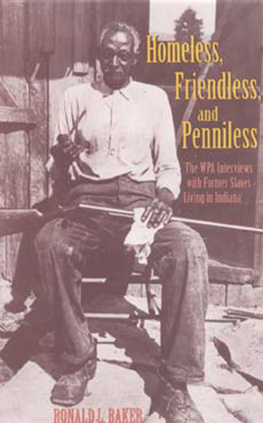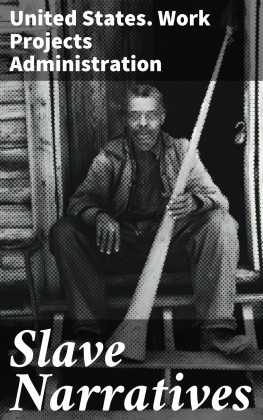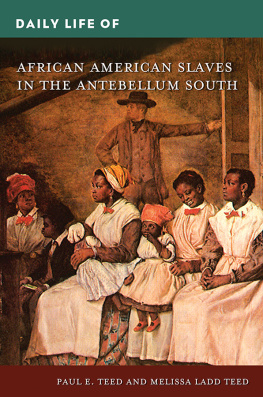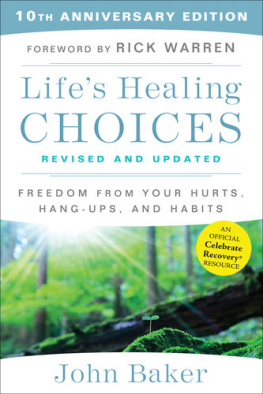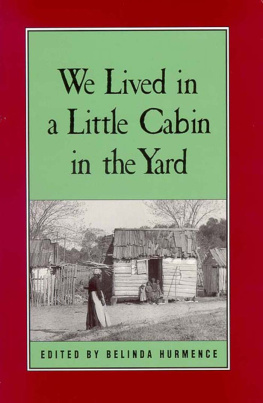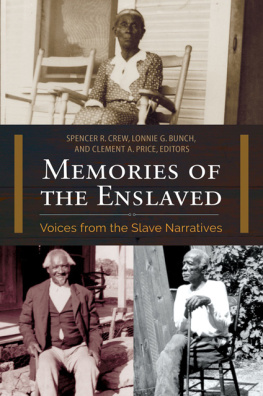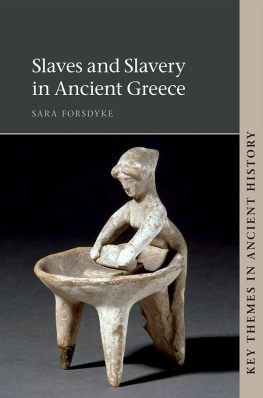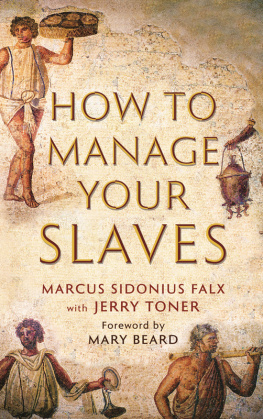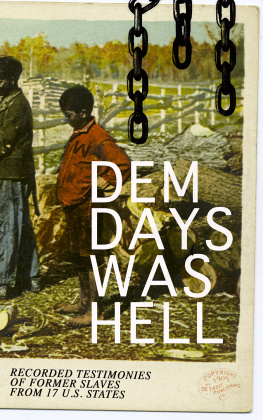HOMELESS,
FRIENDLESS,
AND PENNILESS

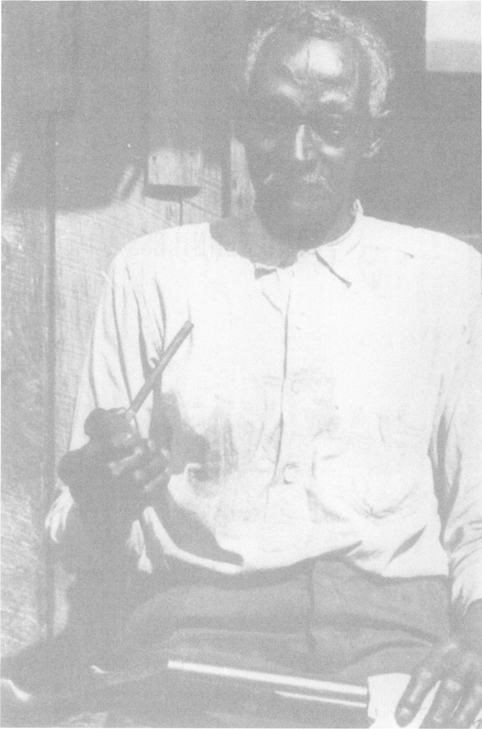
HOMELESS,
FRIENDLESS,
AND PENNILESS
THE WPA INTERVIEWS WITH FORMER
SLAVES LIVING IN INDIANA
Ronald L. Baker

INDIANA UNIVERSITY PRESS
Bloomington and Indianapolis
Publication of this book is made possible in part with the assistance of a Challenge Grant from the National Endowment for the Humanities, a federal agency that supports research, education, and public programming in the humanities.
This book is a publication of
Indiana University Press
601 North Morton Street
Bloomington, IN 47404-03797 USA
http://www.indiana.edu/~iupress
Telephone orders 800-842-6796
Fax orders 812-855-7931
Orders by e-mail iuporder@indiana.edu
2000 by Ronald L. Baker
All rights reserved
No part of this book may be reproduced or utilized in any form or by any means, electronic or mechanical, including photocopying and recording, or by any information storage and retrieval system, without permission in writing from the publisher. The Association of American University Presses Resolution on Permissions constitutes the only exception to this prohibition.
The paper used in this publication meets the minimum requirements of American National Standard for Information SciencesPermanence of Paper for Printed Library Materials, ANSI Z39.481984.
Manufactured in the United States of America
Library of Congress Cataloging-in-Publication Data
Homeless, friendless, and penniless : the WPA interviews with former
slaves living in Indiana / [compiled by] Ronald L. Baker.
p. cm.
From interviews conducted in the 1930s by fieldworkers of the Federal
Writers Project of the Works Progress Administration.
Includes bibliographical references and index.
ISBN 0-253-33803-4 (alk. paper)
1. SlavesIndianaInterviews. 2. SlavesSouthern StatesSocial
conditionsSources. 3. Plantation lifeSouthern StatesHistory
Sources. I. Baker, Ronald L., date. II. Federal Writers Project.
E444 .H66 2000
975-dc21
00-032004
1 2 3 4 5 05 04 03 02 01 00
TO
JILL

Nowhere do American history and folklore intersect more closely than in the peculiar institution.
RICHARD M. DORSON

CONTENTS
ILLUSTRATIONS

I thank Robert L. Carter and David E. Vancil of the Rare Books and Special Collections Department of the Cunningham Memorial Library at Indiana State University for making the WPA manuscripts available. Under their supervision, the Indiana WPA files have been carefully organized and indexed, and a microfilm edition and a guide to the collection have been prepared (see Carter and Vancil 1992). A number of other libraries, historical societies, and genealogical societies assisted in locating and providing newspaper articles, obituaries, and photographs. Among those especially helpful in providing materials were the following:
Allen County Public Library
Clay County Genealogical Society
Elkhart County Historical Society
Evansville Museum of Arts and Science
Evansville-Vanderburgh County Public Library
Gary Public Library
Indiana State Library (Newspaper Section, Indiana Division)
Jay County Genealogy Society
Johnson County Historical Society
Library of Congress (Manuscript Division)
Madison-Jefferson County Public Library
Monroe County Historical Museum
Monroe County Library
Noblesville Southeastern Public Library
Ohio County Public Library
Randolph County Historical and Genealogical Society
Saint Joseph County Public Library
Scott County Public Library
Southern Indiana Genealogical Society
Tippecanoe County Historical Association
Vigo County Public Library
I also thank Father Anthony Spicuzza, pastor of the Annunciation of the Blessed Virgin Mary Church in Brazil, Indiana, for ushering my family through a rite of passage while I was working on this book. Father Spicuzza, a family friend for years, claims that he is glad he does not have the talent to write books. Though he has the intellect, wit, compassion, and experience to write a shelf of books, helike Socrates, Jesus, and the former slaves who told the stories in this bookdeals more immediately with the fundamental reality of life.
I am appreciative, too, of the sabbatical I was awarded during the spring semester of 1998. Without a semesters leave from teaching and administrative duties in the Department of English at Indiana State University, I could not have completed this book.


This book is based on a collection of interviews with former slaves who were living in Indiana in the late 1930s. The interviews were conducted as part of Indianas contribution to a federal project undertaken in seventeen states during the Great Depression. Over a three-year period, former slaves and, in some cases, descendants of former slaves shared their memories with field-workers of the Federal Writers Project (FWP) of the Works Progress Administration (WPA), renamed the Work Projects Administration in 1939. As a result of this early fieldwork in folklore and oral history, today we have an invaluable record of the lives and thoughts of former slaves who moved to Indiana after the Civil War and made significant contributions to the evolving patchwork of Hoosier culture. The Indiana interviews are especially notable because they were collected from freed slaves living in a state that was free during the Civil War. Most of the other former slaves interviewed for the national project still lived in the South. In fact, according to John W. Blassingame, most of the WPA informants interviewed in southern states had spent all of their lives in the same locale as their former masters plantation (Blassingame 1985: 89).
The Indiana slave narratives provide a glimpse of slavery through the memories of those who experienced it; thus, they preserve insiders views of a deplorable chapter in American history. Though the former slaves represented in the Indiana collection lived in Indiana at the time of the interviews, they had, of course, been held in slavery in other states; therefore, the interviews reveal experiences of African Americans enslaved not in a single state but in eleven different states from the Carolinas to Louisiana, though most of them were slaves in Kentucky (see Appendix II). Just as important, the interviews reveal how former slaves fared in Indiana after the Civil War and during the Depression. Some became ministers, a few became educators, and one became a physician; but many lived in poverty and survived on Christian faith and small government pensions.
The interviews on which this book is based are located in the Cunningham Memorial Library at Indiana State University in Terre Haute, Indiana. Since the Department of Public Relations at Indiana State Teachers College, now Indiana State University, was the state sponsor of the Indiana Federal Writers Project, the manuscript files of the Indiana Federal Writers Project were deposited in the library at Indiana State, where they remain. The 36-cubic-foot collection, housed in the Department of Rare Books and Special Collections of the Cunningham Memorial Library, contains around 60,000 pages of material on, among other things, the oral history and folklore of all of Indianas ninety-two counties (see Carter and Vancil 1992). In addition to the interviews with former slaves living in Indiana at that time, the collection is a storehouse of traditional foodways, songs, beliefs, customs, sayings, cures, legends, jokes, and place-name anecdotes, as well as other accounts of Hoosier folklife and local history. Material related to the slave narrative project includes papers about the Underground Railroad in Indiana, a summary of slave laws in Indiana, records of indentures in Indiana, and an account of the Roberts Settlement, a black community in Hamilton County. The slave narrative project represented here was simply a small, albeit important, part of a larger project funded by the federal government during the Depression to provide jobs for unemployed white-collar workers. A major goal of the Federal Writers Project was the preparation and publication of a guidebook for each state; Indianas guide,

